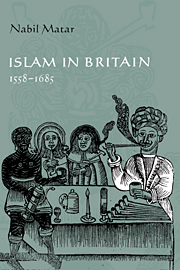Book contents
- Frontmatter
- Contents
- Acknowledgments
- Transcription
- Introduction: Islam in early modern Britain
- 1 “Turning Turke”: conversion to Islam in English writings
- 2 The renegade on stage and in church
- 3 “Arabia Britannica”: “Alcoran” and the legacy of Arabic Islam
- 4 “Baptizing the Turk”: conversion to Christianity in English writings
- 5 Eschatology and the Saracens
- Conclusion: Islam and Britain: centripetal to centrifugal
- Bibliography
- Index
1 - “Turning Turke”: conversion to Islam in English writings
Published online by Cambridge University Press: 27 October 2009
- Frontmatter
- Contents
- Acknowledgments
- Transcription
- Introduction: Islam in early modern Britain
- 1 “Turning Turke”: conversion to Islam in English writings
- 2 The renegade on stage and in church
- 3 “Arabia Britannica”: “Alcoran” and the legacy of Arabic Islam
- 4 “Baptizing the Turk”: conversion to Christianity in English writings
- 5 Eschatology and the Saracens
- Conclusion: Islam and Britain: centripetal to centrifugal
- Bibliography
- Index
Summary
A year before the Turkey Company's first charter was granted in September 1581, the Ottoman Sultan sent to Queen Elizabeth the terms on which he would permit English traders to conduct commercial activity in his dominions. In The interpretation of the letters, or privilege of the most mightie and Musumanlike Emperour Zuldan Murad Can, granted at the request of Elizabeth by the grace of the most mightie God (1580), which was later published by Hakluyt, Sultan Murad III assured the Queen of his cooperation and of the release of all Britons who had been taken prisoners and “detained in captivitie” in Turkey and North Africa. But then, the Sultan added:
18 … [should Muslims capture and sell a slave] if the partie shalbe found to be English, and shall receive the holy religion, then let him freely be discharged, but if he wil still remaine a Christian, let him then be restored to the Englishmen.
There was an official Ottoman position regarding the status of Englishmen who deserted their faith and became Muslims. The Queen had to concede that some of her subjects would convert to Islam, renounce their allegiance to England and become subjects of the Sultan.
The English commercial initiative to the Ottoman Empire as well as the numerous sixteenth-century continental writings about the “Turks” made Britons realize that many of their seafaring and traveling compatriots were exposed to the danger or allure of Islam. Because there were Christians who succumbed to Islamic temptation and “turned Turke,” English and other writers focused part of their attention on the nature and implications of what they viewed as the most heinous of sins – apostasy.
- Type
- Chapter
- Information
- Islam in Britain, 1558–1685 , pp. 21 - 49Publisher: Cambridge University PressPrint publication year: 1998



